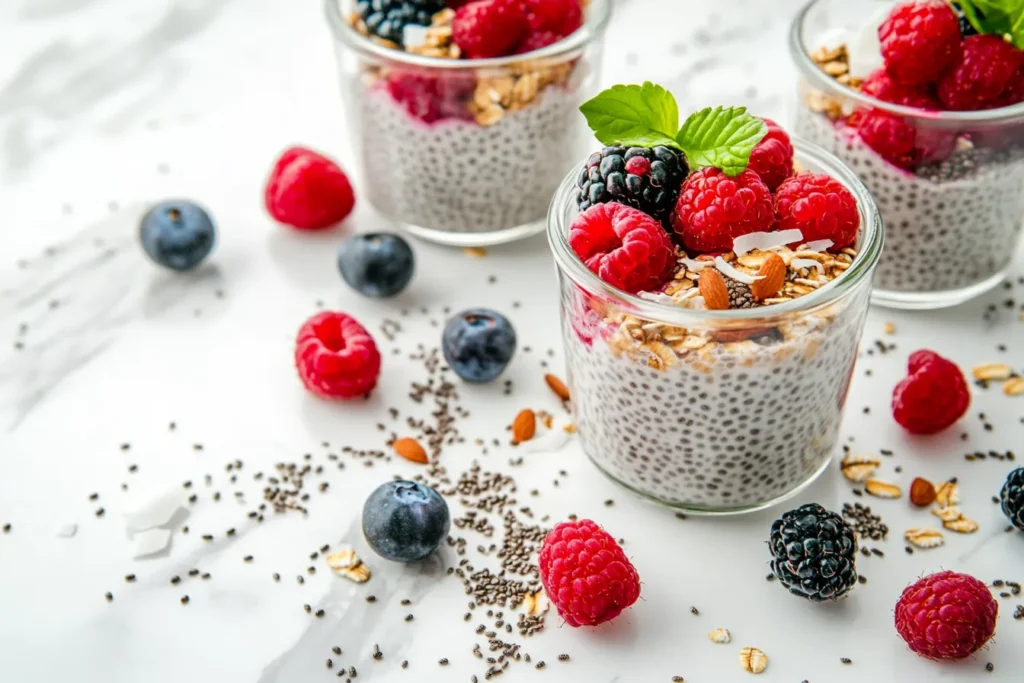Introduction
Living with Polycystic Ovary Syndrome (PCOS) means learning how your body responds to food, stress, sleep, and hormones—and breakfast is one of the most powerful tools you have in your daily routine. A balanced, PCOS-friendly breakfast can reduce insulin spikes, manage weight, support fertility, and keep those pesky sugar cravings at bay all morning long.
But let’s face it—between busy schedules and confusing nutrition advice, figuring out what to eat isn’t always easy. That’s why we’ve crafted this comprehensive guide on PCOS breakfast recipes that actually work. We’re talking real food, real results, and practical options for every lifestyle—from 5-minute smoothies to weekend brunches you’ll crave..Cottage Cheese With Fruit Breakfast Bowls
Whether you’ve just been diagnosed or have been navigating PCOS for years, this article gives you everything you need to build breakfasts that support your hormones, energy, and overall health.
Let’s dive in.
Understanding PCOS and Nutritional Needs
What is PCOS?
Polycystic Ovary Syndrome (PCOS) is a complex hormonal disorder that affects up to 1 in 10 women of reproductive age. It is often marked by irregular periods, excess androgens (male hormones), acne, hair loss, and multiple small cysts on the ovaries. However, the underlying issue usually ties back to insulin resistance, where the body struggles to use insulin effectively. This can lead to blood sugar spikes, weight gain, and eventually Type 2 diabetes if left unmanaged.
Nutrition plays a key role in addressing these root causes. A consistent, nourishing breakfast can help manage blood sugar levels, reduce inflammation, and regulate hormones—all vital for PCOS health.
The Role of Insulin in PCOS
Insulin is a hormone that helps your body absorb glucose (sugar) from the blood and use it for energy. Many women with PCOS have insulin resistance, meaning their cells don’t respond well to insulin. This forces the pancreas to produce even more insulin to keep blood sugar levels stable. High insulin levels, in turn, stimulate the ovaries to produce more androgens like testosterone, worsening PCOS symptoms such as acne and irregular periods..Chocolate Chia Pudding Recipe
Eating a high-carb or sugary breakfast—like cereal, toast with jam, or pastries—can cause a quick spike in insulin, setting you up for a day of hormonal chaos. A PCOS-friendly breakfast, on the other hand, aims to slow the absorption of sugar and minimize insulin production. This helps stabilize energy and moods throughout the day.
Inflammation and Hormone Imbalance
PCOS is often associated with chronic low-grade inflammation, which can contribute to fatigue, weight gain, and worsened insulin resistance. Certain foods—especially refined sugar, processed carbs, and trans fats—can fuel this inflammation.
By starting your day with anti-inflammatory ingredients like berries, leafy greens, omega-3-rich seeds, and olive oil, you can begin your morning with a defense against inflammation. Over time, consistently reducing inflammation can help rebalance your hormones and improve your metabolism.
Why Breakfast is Crucial for PCOS
Skipping breakfast or opting for a nutritionally weak meal can be especially harmful for those with PCOS. Here’s why breakfast matters:
- Regulates cortisol: Cortisol, your stress hormone, is highest in the morning. Eating protein and fiber early can reduce cortisol and prevent fat storage.
- Prevents energy crashes: A balanced breakfast provides steady energy, preventing mid-morning fatigue and sugar cravings.
- Supports weight management: People who eat breakfast tend to have better appetite control and less evening bingeing.
- Improves fertility: Stabilizing insulin through proper nutrition can support ovulation and menstrual regularity, improving fertility outcomes in many PCOS cases.
A Word on Intermittent Fasting and PCOS
Some people explore intermittent fasting (IF) as a way to manage PCOS. While it may benefit some, women with PCOS who skip breakfast may disrupt hormone balance, especially cortisol and thyroid hormones. It’s important to experiment carefully and work with a health professional if considering fasting protocols. For most, a high-protein, balanced breakfast within an hour or two of waking is ideal.

Key Nutrients for PCOS Management
Creating PCOS-friendly breakfasts means being intentional about every nutrient on your plate. While there’s no one-size-fits-all plan, certain macro and micronutrients have been shown to improve insulin sensitivity, hormone balance, and inflammation. Let’s break down the building blocks of a healthy PCOS breakfast.
High-Quality Protein: The Foundation of Every PCOS Breakfast
Protein is the most important macronutrient for managing PCOS symptoms in the morning. It supports:
- Stable blood sugar levels by slowing down the digestion of carbs
- Reduced cravings for sugar and processed snacks
- Muscle preservation and metabolism support, especially if you’re losing weight
Aim for 20 to 30 grams of protein at breakfast. Some great options include:
- Eggs (6g protein per egg)
- Greek yogurt (18–20g per cup)
- Cottage cheese (28g per cup)
- Tofu or tempeh
- Protein powder (whey, pea, or collagen)
- Lean meats like turkey bacon or smoked salmon
Fiber-Rich Carbohydrates: Not All Carbs Are Bad
Contrary to some diet myths, not all carbohydrates are harmful for PCOS. In fact, high-fiber carbs can help reduce insulin resistance and support digestion. The key is to choose low-glycemic (low-GI) carbs that don’t spike your blood sugar.
Best carb sources for breakfast include:
- Oats: Rich in beta-glucan, which lowers cholesterol and slows glucose absorption
- Quinoa: A complete protein and gluten-free whole grain
- Sweet potatoes: Full of fiber, potassium, and vitamin A
- Whole-grain bread: Choose sprouted or rye-based varieties with low sugar
- Fruits: Berries, apples, and pears are lower in sugar and high in antioxidants
Combine these with protein and fat to prevent insulin spikes and keep you full for hours.
Healthy Fats: Essential for Hormones
Fat isn’t your enemy—especially when dealing with PCOS. Healthy fats help regulate hormones, support brain function, and reduce inflammation. They also help you stay full and satisfied, which prevents overeating later in the day..How to Mix Greek Yogurt and Protein Powder
Ideal fats to add to breakfast:
- Avocado: Loaded with potassium and healthy monounsaturated fats
- Nuts and seeds: Almonds, walnuts, chia, flax, and pumpkin seeds offer omega-3s and fiber
- Nut butters: Go for natural, no-sugar-added almond or peanut butter
- Olive oil: Drizzle over savory dishes or use to sauté veggies
- Coconut oil: Can be used in cooking or added to smoothies
Micronutrients That Matter
PCOS is also linked to deficiencies in key vitamins and minerals, which can affect metabolism and reproductive health. Be sure to include foods high in:
- Magnesium: Found in leafy greens, nuts, seeds, and whole grains; supports insulin and muscle function
- Zinc: Found in seeds, eggs, and legumes; supports ovulation and hair health
- Vitamin D: Important for hormone balance; get from fortified foods or sunshine exposure
- B vitamins: Crucial for energy metabolism, found in eggs, oats, and nutritional yeast
Foods to Avoid in a PCOS Breakfast
Here are common breakfast culprits that can aggravate PCOS symptoms:
- Refined cereals and granola: Often packed with added sugars and low in fiber
- Pastries and baked goods: High in trans fats, refined flour, and sugar
- Flavored yogurts: Loaded with added sugars that spike insulin
- Fruit juices: Even natural ones can flood your system with sugar
- Protein bars: Many have hidden sugars and low-quality ingredients
Instead, opt for whole, minimally processed foods you can combine for balance and energy.

Top 18 PCOS Breakfast Recipes
Crafting breakfast meals that are both PCOS-friendly and flavorful doesn’t have to be a challenge. Whether you’re rushing out the door or enjoying a slow morning, these recipes are packed with protein, fiber, and healthy fats to support hormonal balance, reduce cravings, and sustain your energy throughout the day.
Below, we’ve divided the recipes into three easy-to-navigate categories: Quick Weekday Breakfasts, Make-Ahead Options, and Slow Weekend Recipes.
6 Quick Weekday Breakfasts
These options take less than 10 minutes and are perfect for busy mornings:
1. Greek Yogurt Parfait
- Ingredients: ¾ cup plain Greek yogurt, ½ cup mixed berries, 1 tablespoon chia seeds, 1 tablespoon walnuts.
- Benefits: Rich in protein, fiber, omega-3s, and antioxidants.
- Tip: Prep ingredients in jars the night before.
2. Avocado Toast with Egg
- Ingredients: 1 slice sprouted whole-grain bread, ½ avocado, 1 fried or poached egg, chili flakes.
- Benefits: Healthy fats and protein that keep you full until lunch.
3. Protein Oatmeal
- Ingredients: ½ cup rolled oats, 1 scoop protein powder, 1 tablespoon almond butter, blueberries.
- Benefits: Balanced macronutrients and low glycemic load.
4. Cottage Cheese & Fruit Bowl
- Ingredients: 1 cup cottage cheese, sliced apple or pear, cinnamon, sunflower seeds.
- Benefits: High protein and easy to digest.
5. Tofu Scramble Wrap
- Ingredients: Crumbled tofu, spinach, bell pepper, turmeric, whole-wheat wrap.
- Benefits: Vegan protein and anti-inflammatory ingredients.
6. Green Smoothie
- Ingredients: Spinach, frozen berries, unsweetened almond milk, 1 tablespoon chia seeds, vegan protein powder.
- Benefits: Quick, anti-inflammatory, and gut-friendly.
6 Make-Ahead PCOS Breakfast Recipes
Meal prepping can help you stay consistent and reduce the temptation of processed convenience foods.
7. Chia Seed Pudding
- Ingredients: 3 tablespoons chia seeds, 1 cup almond milk, 1 scoop protein powder, cinnamon, and berries.
- Prep Tip: Soak overnight in mason jars.
8. Egg Muffins
- Ingredients: Whisked eggs, chopped spinach, onion, bell pepper, feta.
- Prep Tip: Bake in muffin tins and refrigerate or freeze.
9. Overnight Oats
- Ingredients: ½ cup oats, ½ cup almond milk, ¼ cup Greek yogurt, flaxseeds, banana slices.
- Prep Tip: Assemble in batches for 3–4 days.
10. Protein Pancakes
- Ingredients: 1 mashed banana, 2 eggs, 1 scoop protein powder, cinnamon.
- Prep Tip: Cook a batch and store in fridge/freezer.
11. Savory Quinoa Bowl
- Ingredients: Cooked quinoa, avocado, poached egg, cherry tomatoes.
- Prep Tip: Store cooked quinoa for quick assembly.
12. Almond Flour Muffins
- Ingredients: Almond flour, eggs, grated zucchini, olive oil, spices.
- Prep Tip: Bake ahead and store in airtight container.
6 Slow Weekend Breakfast Recipes
These comforting recipes are great for days when you have time to enjoy cooking and relaxing.
13. Sweet Potato & Kale Hash
- Ingredients: Diced sweet potatoes, kale, onion, 2 eggs.
- Cooking Tip: Roast potatoes ahead to speed up.
14. Breakfast Tacos
- Ingredients: Scrambled eggs, black beans, avocado, salsa, corn tortillas.
- Benefits: Balanced carbs and plant protein.
15. Shakshuka
- Ingredients: Eggs poached in tomato sauce with garlic, onion, and paprika.
- Serving Tip: Add a side of gluten-free bread or lentils.
16. Zucchini Fritters
- Ingredients: Grated zucchini, egg, almond flour, garlic.
- Serving Tip: Serve with Greek yogurt dip.
17. Protein Waffles
- Ingredients: Almond flour, eggs, baking soda, vanilla protein powder.
- Toppings: Add berries and nut butter.
18. Mediterranean Breakfast Platter
- Ingredients: Hard-boiled eggs, olives, cucumbers, cherry tomatoes, hummus.
- Serving Tip: Pair with a slice of whole-grain bread.

How to Structure a PCOS-Friendly Breakfast
The success of a PCOS-friendly diet lies not only in what you eat but also in how you structure your meals—especially breakfast. A well-balanced morning meal sets the tone for stable energy, reduced cravings, and hormonal stability throughout the day.
The 30/30/40 Macronutrient Rule
To build a hormone-supportive breakfast, follow the 30/30/40 rule:
- 30% Protein: Aim for 20–30 grams of protein from eggs, Greek yogurt, tofu, or protein powders.
- 30% Healthy Fats: Include avocado, nuts, seeds, olive oil, or nut butter.
- 40% Low-GI Carbs: Focus on oats, quinoa, sweet potatoes, berries, or whole grains.
This combination slows digestion, prevents blood sugar spikes, and boosts satiety—helping you feel fuller, longer.
Portion Control Without Obsessing
While portion control is important, especially for managing insulin levels and supporting weight loss, it doesn’t mean you need to count every calorie.
Use this simple visual guide:
- Protein: 1 palm-sized serving
- Carbs: 1 cupped hand of low-GI grains or fruit
- Fats: 1 thumb-sized amount (or small handful of nuts)
- Veggies: 2 handfuls of non-starchy vegetables like spinach, peppers, or kale
Meal Timing and Frequency
Breakfast timing can influence insulin sensitivity and cortisol levels. Here’s what research and expert consensus recommend:
- Eat within 60–90 minutes of waking: This helps regulate cortisol and blood sugar.
- Avoid long gaps between meals: Going too long without eating can trigger blood sugar crashes and cravings.
- Listen to your body: Some people may prefer a small meal early, followed by a snack or second breakfast mid-morning.
Morning Hydration Matters
Don’t forget your fluids. Hydration first thing in the morning supports digestion and metabolism.
- Start with a glass of warm lemon water or herbal tea.
- Avoid sugary drinks or excessive caffeine—especially if you haven’t eaten yet.

Common Mistakes to Avoid in PCOS Breakfasts
Even when you’re trying to eat healthfully, there are common breakfast habits that can undermine your progress with PCOS. Let’s look at what to skip and why.
Mistake #1: Skipping Breakfast Altogether
While some intermittent fasting plans recommend skipping breakfast, this can backfire for many women with PCOS. It often leads to:
- Increased cortisol levels
- Blood sugar instability
- Evening hunger and bingeing
Unless supervised by a professional, it’s best to eat something balanced within 1–2 hours of waking.
Mistake #2: Overloading on Sugar
Many popular breakfast foods are deceptively high in sugar. Examples include:
- Fruit juice
- Flavored yogurts
- Granola bars
- Commercial cereals
- Pastries
Instead, build a breakfast around natural sugars (like berries) paired with fat and protein to slow absorption.
Mistake #3: Too Many “Healthy” Carbs
Even whole-grain foods like toast, oatmeal, or granola can be problematic if not paired with enough protein or fat. Overdoing carbs without balance leads to insulin spikes—exactly what we want to avoid.
Mistake #4: Ignoring Labels
Packaged foods marketed as “healthy” can still contain:
- Added sugars
- Hidden trans fats
- Artificial sweeteners
- Processed oils
Read ingredient lists, not just nutrition facts. Look for whole-food ingredients and minimal additives.
Mistake #5: Eating Too Little
Skipping or under-eating breakfast can slow your metabolism and increase hunger later in the day. It can also reduce your body’s ability to handle insulin efficiently. Don’t be afraid to eat a full, nutrient-dense meal to start your day strong.
Frequently Asked Questions
What is the best time to eat breakfast for PCOS?
The ideal window is within 60–90 minutes of waking. This timing helps regulate cortisol, improve insulin sensitivity, and prevent mid-morning energy crashes.
Can I drink coffee with PCOS in the morning?
Yes, but in moderation. It’s best to avoid coffee on an empty stomach as it may spike cortisol. Pair it with a protein- and fat-rich breakfast to buffer the effect. Consider switching to matcha or herbal teas if caffeine worsens your symptoms.
Are smoothies a good PCOS breakfast?
Absolutely—when balanced properly. A good PCOS smoothie includes:
- A protein source (protein powder, Greek yogurt, or nut butter)
- Healthy fat (chia, flax, or avocado)
- Fiber (berries, spinach, seeds)
- No added sugars
Avoid fruit-only smoothies or those with juice bases.
Is it okay to eat carbs for breakfast with PCOS?
Yes! The key is to choose low-GI, fiber-rich carbs such as oats, quinoa, sweet potatoes, and berries. Always pair with protein and fat to slow digestion and stabilize blood sugar.
What breakfast helps with PCOS weight loss?
For weight loss, focus on low-calorie, high-protein, high-fiber meals like:
- Greek yogurt with seeds and berries
- Tofu scramble with veggies
- Protein oatmeal with nut butter and flaxseed
Avoid refined carbs and high-sugar options.
Can I use protein powder if I have PCOS?
Yes—clean, high-quality protein powders can be a great addition. Look for ones with:
- No added sugar or artificial sweeteners
- At least 20g protein per serving
- Plant-based or grass-fed whey options
Conclusion
Managing PCOS is a long-term journey, but starting your day with a hormone-supportive breakfast is one of the simplest and most effective habits you can develop.
By focusing on high-protein, fiber-rich, and healthy fat meals, you’ll regulate insulin, curb cravings, and support long-term metabolic and reproductive health. With the 18 recipes and tips in this article, you now have the tools to build a nourishing morning routine—whether you’re rushing out the door or enjoying a cozy weekend at home.
Remember: consistency beats perfection. Choose one new recipe to try this week, prep ahead when you can, and listen to your body’s cues. Your hormones will thank you.

Name: Greek Yogurt Parfait
Ingredients
Equipment
Method
- Instructions:
- In a bowl or jar, layer Greek yogurt at the bottom.
- Add a layer of fresh berries.
- Sprinkle chia seeds and nuts on top.
- Optional: refrigerate overnight for a ready-to-go meal.
- Serve chilled and stir before eating.

